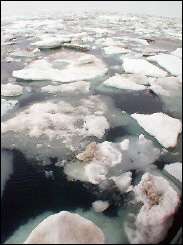Arctic global warming may be irreversible

Scientists, noting sea ice in the Arctic has failed to form for the second consecutive winter, fear global warming may be irreversible in polar areas.
Since the Arctic region shows signs of both winter and summer ice melting, scientists fear an environmental "positive feedback" has started, in which global warming melts ice that causes the seas to warm further since more sunlight is absorbed by a dark ocean rather than being reflected by white ice, The Independent reported Tuesday.
Mark Serreze, a sea ice specialist at the U.S. National Snow and Ice Data Center in Colorado, said the Arctic sea ice cover as of September was at its lowest extent since satellite monitoring began in 1979, and probably the lowest in 100 years.
Professor Peter Wadhams of Cambridge University told the Independent: "One of the big changes this winter is that a large area of the Barents Sea has remained ice-free for the first time. Climate models did predict a retreat of sea ice in the Barents Sea, but not for a few decades yet, so it is a sign that the changes that were predicted are indeed happening -- but much faster than predicted."
Copyright 2006 by United Press International















